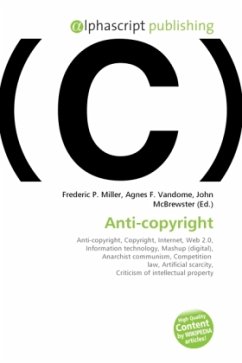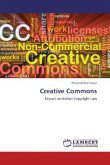Anti-copyright refers to the complete or partial opposition to prevalent copyright laws. Copyright is known as the author's rights for copies to be only made by the author or with his/her authorization in form of a license.The classic argument for copyright is the view that granting developers temporary monopolies over their works encourages further development and creativity by giving the developer a source of income.A central anti-copyright argument is that copyright has never been of net benefit to society, and instead serves to enrich a few at the expense of creativity.Anti-copyright groups may question the logic of copyright on economic and cultural grounds. In the context of the Internet and Web 2.0 it is argued that copyright law needs to be adapted to modern information technology. More general anti-copyright arguments point to the fact that humans have always copied and establish arguments around the need to share or mash-up culture and knowledge.
Bitte wählen Sie Ihr Anliegen aus.
Rechnungen
Retourenschein anfordern
Bestellstatus
Storno








